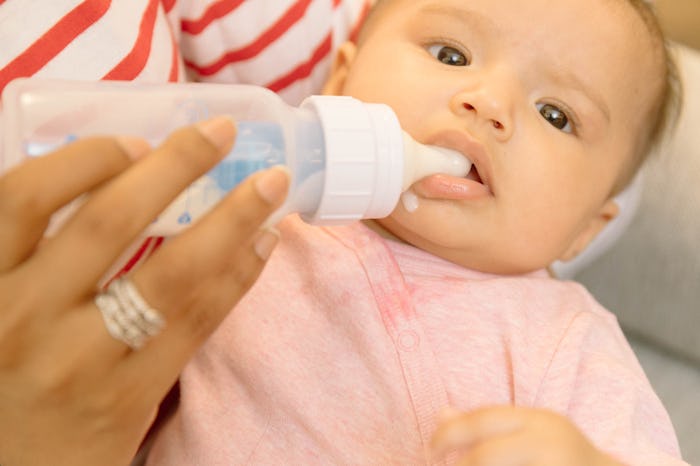By the time your baby masters one milestone, they're on to the next one. Whether it's transitioning from a bassinet to a crib, dropping a nap, or crawling one minute and walking the next, constant change is the only inevitable in your little one's life. The same goes with their feeding habits. Thankfully, if you're a formula mom (or a breastfeeding mom who pumps!) there are a few signs your baby should stop using a bottle that'll let you know when it's time to help your babe move on to something bigger, better, and probably (read: definitely) messier.
The suggested age to begin the weaning process, according to The American Academy of Pediatrics, is nine months, with completion at, or around, 15 months. Benioff Children's Hospital in San Fransisco says you can offer a sippy cup as young as six months of age, just to get the ball rolling. But again, and always, every baby is different so there is no "one perfect age" to start the weaning process.
So, why wean at all? Well, it's important to kick the bottle before your child develops tooth decay due to a prolonged attachment. And if your little one uses a bottle to help them sleep at night, they could develop sleep issues, too. Another important reason to wean is to help teach your baby necessary feeding skills, which have a direct influence on their development and health. So if you aren't sure if our baby's ready to transition, here are some signs it's time to ditch the bottle.
They Can Sit Up By Themselves
Once your baby can hold themselves upright, it's time to think about introducing a sippy cup. According to BabyCenter, this often happens between 7 and 9 months of age, and your baby should be able to sit up unassisted (for at least a few minutes) by 8 months. You shouldn't rush this stage, though, according to Pediatrician Kurt Heyrman, M.D., who tells Parents that's it's important your baby has developed the motor skills necessary to hold their neck upright. Once they're fully upright, gradual bottle weaning might be more successful.
They're Interested In Solid Foods
Kid's Health says you can introduce solid foods around 6 months of age. The ideal age to give spoon-feeding a try has more to do with their tongue-thrust reflex — the reflex that keeps them from choking, and also helps push food out of their mouth — or, more notably, when it's gone. They should be able to hold their own head and neck, and should be avidly showing an interest in food, before you consider taking that bottle away. This is a major sign the bottle can begin making it's final appearances.
They Eat From A Spoon
If your baby has already shown an interest, and is now readily eating from the spoon, you can safely begin weaning them off the bottle. This transition, from bottle-feeding exclusively to eating "real" food, will allow them to get the necessary amount of nutrients they need from solids.
They're Close To Their First Birthday
Jonathon Maguire, M.D., a pediatrician at St. Michael's Hospital in Toronto, tells Parents that waiting until after your baby's first birthday might make it harder for your little one to ditch the bottle. If they're one and still using a bottle they're likely very attached and, as a result, fight against the idea of leaving it behind.
They're Used To A Regular Mealtime
If all of the above are true, and you've set regular mealtimes and routines in place, your baby is most likely waiting on you to make the first move. You can start decreasing bottle-feeding times until, eventually, you make the switch to a "big kid" cup full-time.
Having a routine will make the transition a little easier — on both of you.
Check out Romper's new video series, Bearing The Motherload, where disagreeing parents from different sides of an issue sit down with a mediator and talk about how to support (and not judge) each other’s parenting perspectives. New episodes air Mondays on Facebook.
